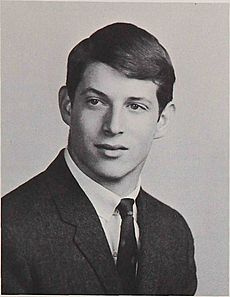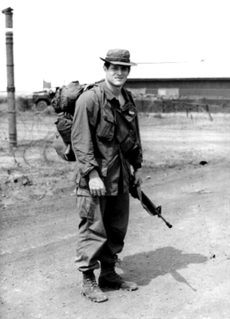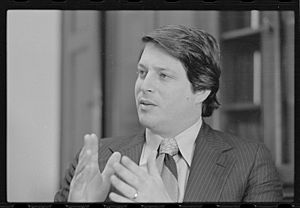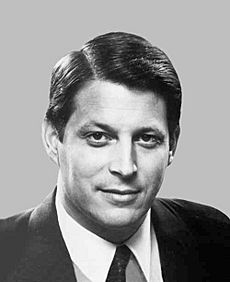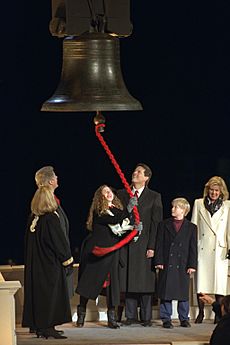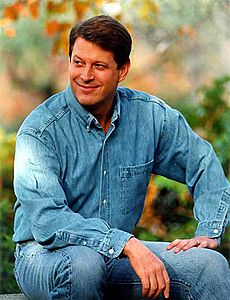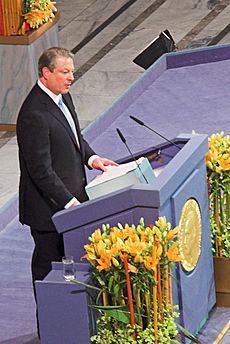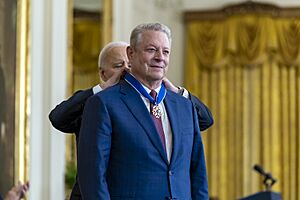Al Gore facts for kids
Quick facts for kids
Al Gore
|
|
|---|---|
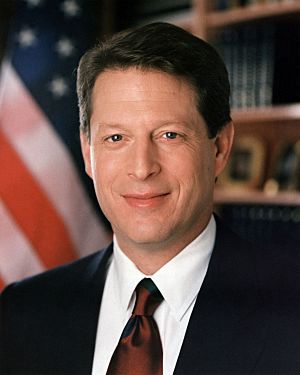
Official portrait, 1994
|
|
| 45th Vice President of the United States | |
| In office January 20, 1993 – January 20, 2001 |
|
| President | Bill Clinton |
| Preceded by | Dan Quayle |
| Succeeded by | Dick Cheney |
| United States Senator from Tennessee |
|
| In office January 3, 1985 – January 2, 1993 |
|
| Preceded by | Howard Baker |
| Succeeded by | Harlan Mathews |
| Member of the U.S. House of Representatives from Tennessee |
|
| In office January 3, 1977 – January 3, 1985 |
|
| Preceded by | Joe L. Evins |
| Succeeded by | Bart Gordon |
| Constituency |
|
| Personal details | |
| Born |
Albert Arnold Gore Jr.
March 31, 1948 Washington, D.C., U.S. |
| Political party | Democratic |
| Spouse | |
| Children | 4, including Karenna and Kristin |
| Parents |
|
| Education | |
| Occupation |
|
| Civilian awards | List of awards and honors |
| Signature |  |
| Military service | |
| Branch/service | United States Army |
| Years of service | 1969–1971 |
| Rank | Specialist 4 |
| Unit | 20th Engineer Brigade |
| Battles/wars | Vietnam War |
| Military awards |
|
Albert Arnold Gore Jr. (born March 31, 1948) is an American politician, businessman, and environmental activist. He served as the 45th vice president of the United States from 1993 to 2001 under President Bill Clinton. Before that, he was a United States senator for Tennessee from 1985 to 1993. He also served in the U.S. House of Representatives from 1977 to 1985.
Gore was the Democratic candidate for president of the United States in the 2000 presidential election. He won the most individual votes across the country but lost the election to George W. Bush.
After his time as vice president, Gore became well-known for his work on climate change. He received the Nobel Peace Prize in 2007 for his efforts. He is also the founder of The Climate Reality Project, an organization that teaches people about climate change.
Contents
Early Life and School
Albert Arnold Gore Jr. was born on March 31, 1948, in Washington, D.C.. His father, Albert Gore Sr., was a U.S. Senator. His mother, Pauline LaFon Gore, was one of the first women to graduate from Vanderbilt University Law School.
During the school year, Al Gore lived with his family in Washington, D.C. In the summers, he worked on their family farm in Carthage, Tennessee.
He attended St. Albans School, a school for boys in Washington, D.C. He was the captain of the football team and participated in other sports and activities. After graduating, he went to Harvard University.
College Years at Harvard
Gore started at Harvard College in 1965. He first wanted to study English but later chose government. He was elected president of his freshman student government council. One of his roommates was actor Tommy Lee Jones.
In his later years at Harvard, Gore became very interested in his studies. He took a class with Roger Revelle, a scientist who studied global warming. This class sparked Gore's interest in environmental issues. He graduated from Harvard in 1969.
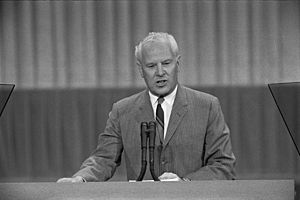
During college, many students protested the Vietnam War. Gore was against the war but did not join the student protests. He helped his father write a speech against the war for the 1968 Democratic National Convention.
Military Service and Early Career
Serving in the Army
After graduating from Harvard in 1969, Gore was eligible for the military draft. He decided to join the Army. He felt it was important to serve his country. He also believed that if he avoided service, someone else with fewer choices would have to go in his place.
Gore had basic training and then became a journalist at Fort Rucker, Alabama. In January 1971, he was sent to Vietnam. He worked as a journalist for The Castle Courier with the 20th Engineer Brigade in Biên Hòa. He received an honorable discharge from the Army in May 1971.
Gore later said he was proud to wear his country's uniform. His experience in Vietnam made him realize that many South Vietnamese people wanted to keep their freedom.
Journalism and Law School
After returning from Vietnam, Gore felt a bit lost. His parents wanted him to go to law school. Instead, he first attended Vanderbilt University Divinity School to explore "spiritual issues."
In 1971, Gore also started working as an investigative reporter for The Tennessean newspaper. His reports on corruption led to the arrest of two local officials.
In 1974, he took a break from journalism to attend Vanderbilt University Law School. He realized that while he could expose corruption as a journalist, he couldn't change it. He decided to run for the U.S. House of Representatives in 1976 and left law school.
Serving in Congress
Al Gore began his career in the U.S. Congress at age 28. He served for 16 years, first in the House of Representatives (1977–1985) and then in the Senate (1985–1993). He often spent weekends in Tennessee, working with the people he represented.
From House to Senate
In 1976, Gore decided to run for the House of Representatives. He won the election and was re-elected three times. In 1984, he successfully ran for a seat in the U.S. Senate. He won despite Republican President Ronald Reagan also winning Tennessee that year.
During his time in Congress, Gore was seen as a "moderate" politician. This means he held views that were not extreme on either side. He supported some conservative ideas and some liberal ideas. For example, he voted for the bill that made Martin Luther King Jr. Day a national holiday.
Gore was very interested in technology. He was known as an "Atari Democrat" because of his interest in new technologies like computers and genetic engineering. In 1979, he became the first member of Congress to appear on C-SPAN.
He worked to promote high-speed telecommunications. He believed it would help the economy and education. He introduced the Supercomputer Network Study Act of 1986. This work led to the High Performance Computing Act of 1991, also known as "The Gore Bill." This bill helped create the National Information Infrastructure, which Gore called the "information superhighway."
Gore also focused on environmental issues. He held the first congressional hearings on climate change. He continued to speak about it throughout the 1980s. In 1990, he led a conference with leaders from over 42 countries. They discussed a "Global Marshall Plan" to help developing countries grow while protecting the environment.
Personal Challenges and a Book
On April 3, 1989, Gore's six-year-old son, Albert, was hit by a car. He was seriously injured. The Gores spent a month in the hospital with their son. This event was very difficult for the family and changed Gore's outlook on life.
In 1991, Gore decided not to run for president in 1992. He said his son's accident was a reason. He wanted to focus on his family. During this time, Gore wrote Earth in the Balance. This book became a best-seller and was the first written by a sitting U.S. Senator to make The New York Times Best Seller list since John F. Kennedy's Profiles in Courage.
First Presidential Campaign (1988)
In 1988, Al Gore ran for the Democratic Party's nomination for President. He was 39 years old, making him one of the youngest serious presidential candidates.
He won primaries in seven states, including Arkansas, North Carolina, and Tennessee. However, he eventually dropped out of the race.
Vice President (1993–2001)
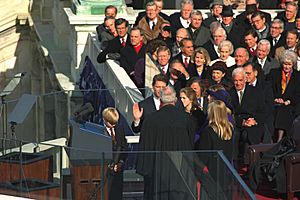
Al Gore became Bill Clinton's running mate for the 1992 United States presidential election. Clinton chose Gore because of his experience in foreign policy, his work on the environment, and his commitment to his family.
Their choice was unusual because both Clinton and Gore were from the South and had similar political views. However, many experts later said Gore was one of the best vice presidential picks in many years.
Clinton and Gore were inaugurated on January 20, 1993. They worked very closely together. Clinton made Gore a main advisor and involved him in important decisions more than previous vice presidents.
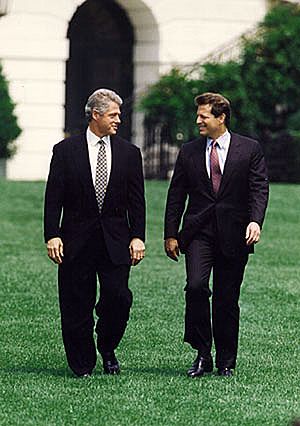
Gore was especially interested in making the government more efficient. He wanted to reduce waste and bureaucracy. During the Clinton administration, the U.S. economy grew significantly. This success was partly due to Gore's focus on developing information technology, which helped create the dot-com boom.
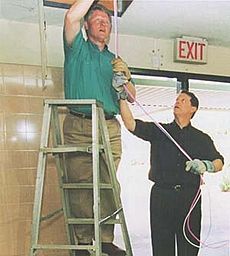
Gore helped popularize the term Information Superhighway, which became another name for the Internet. He was involved in creating the National Information Infrastructure. The Clinton-Gore administration also launched the first official White House website in 1994.
He also continued his environmental work. He launched the GLOBE program on Earth Day 1994. This program used the Internet to help students learn about their environment. He also supported the Kyoto Protocol, an international agreement to reduce greenhouse gasses.
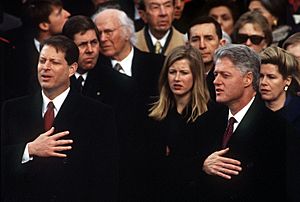
In the 1996 United States presidential election, Clinton and Gore were re-elected. They won with 379 electoral votes and a large margin in the popular vote.
Second Presidential Campaign (2000)
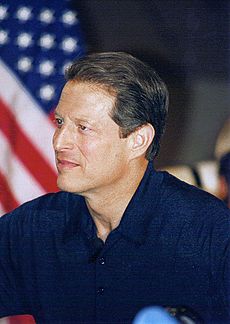
On June 16, 1999, Al Gore officially announced he was running for president. His main message was about strengthening American families. He faced a challenge from former New Jersey senator Bill Bradley in the Democratic primaries. Gore won every primary and caucus, securing the Democratic nomination.
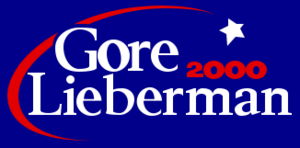
On August 13, 2000, Gore chose Senator Joe Lieberman of Connecticut as his running mate. Lieberman was the first Jewish person to run for the nation's second-highest office.
Gore and his opponent, George W. Bush, were very close in the polls. They had three televised debates.
The Internet and a Misunderstanding
During a 1999 interview, Gore was asked why Democrats should support him. He said, "During my service in the United States Congress, I took the initiative in creating the Internet." This comment was later misunderstood by some people, who claimed Gore said he "invented the Internet."
However, many computer experts and politicians defended Gore. Internet pioneers Vint Cerf and Bob Kahn stated that Gore's efforts in Congress had a "significant and beneficial effect on the still-evolving Internet." Former Republican Speaker of the House Newt Gingrich also said that Gore "most systematically worked to make sure that we got to an Internet."
Gore later made jokes about the misunderstanding. In 2005, when he received a "Lifetime Achievement Award" for his contributions to the Internet, he joked, "Please don't recount this vote."
The 2000 Election Recount
On election night in 2000, news channels first said Gore won Florida, then changed their minds. The vote count in Florida was very close. This led to a recount of the votes.
The recount was stopped by the U.S. Supreme Court on December 12. The Court's decision meant that George W. Bush won Florida by just 537 votes. This gave Bush Florida's 25 electoral votes, and he won the presidency.
Gore won the most individual votes across the country by about 500,000 votes. However, he received 266 electoral votes to Bush's 271. On December 13, 2000, Gore gave a speech conceding the election. He said that for the good of the country, he accepted the Court's decision.
After the Vice Presidency
After leaving office in 2001, Al Gore continued to be a public figure. He focused much of his attention on environmental issues.
Speaking Out on Issues
Starting in 2002, Gore began to speak out about the Bush administration. He criticized the decision to go to war in Iraq. He also spoke about the government's response to Hurricane Katrina in 2005. Gore himself helped evacuate 270 people from New Orleans after the hurricane.
In 2007, Gore wrote a book called The Assault on Reason. In this book, he discussed how television affects public discussions and how the Internet can help improve democracy. In 2008, Gore stated that he believed all people should have the same rights to join together in marriage.
Presidential Speculation
Many people wondered if Gore would run for president again in 2004 or 2008. However, he announced in December 2002 that he would not run in 2004. The September 11 attacks and President Bush's popularity after them were factors in his decision.
Speculation about a 2008 run increased after his 2006 documentary, An Inconvenient Truth, became very popular. Despite his popularity, Gore consistently said he had "no plans to run." He remained firm in his decision not to seek the presidency again.
Gore also remained neutral during the 2008 Democratic primaries. He later endorsed Barack Obama after Obama became the likely nominee. In 2016, he endorsed Hillary Clinton for president.
Environmental Work
Al Gore has been involved in environmental issues since 1976. He is known as one of the "Democrats' Greens" because he sees environmental protection as very important.
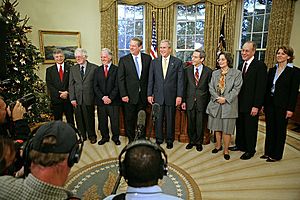
In the late 1990s, Gore strongly supported the Kyoto Protocol, which aimed to reduce greenhouse gas emissions.
In 2004, Gore co-founded Generation Investment Management, a company focused on sustainable investing. He also founded the Alliance for Climate Protection, which created the We Campaign to raise awareness about climate change. He helped organize the Live Earth concerts to promote environmental action.
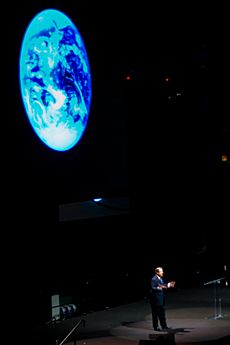
In 2013, Gore became a vegan. Some believe this change in diet is related to his environmental beliefs, as meat production can have an environmental impact.
His film An Inconvenient Sequel: Truth to Power, a follow-up to his 2006 film, came out in 2017. It shows his continued efforts to fight climate change. In 2020, he helped launch Climate TRACE to independently track global greenhouse gas emissions.
Criticisms
Gore has faced some criticism. Some have claimed he has a conflict of interest because he supports green-energy technologies while also investing in them. He has also been criticized for his personal energy use, such as using private jets and owning large homes. His spokesperson has stated that the Gores use renewable energy and have made their home more energy efficient.
Some data in his film An Inconvenient Truth has been questioned. A British judge in 2007 said the film was "broadly accurate" but noted nine alleged errors. The judge ruled the film could be shown in schools if teachers provided additional guidance.
Personal Life
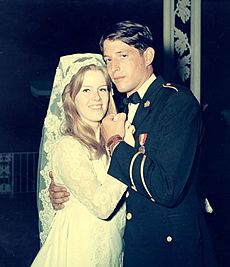
Al Gore met Mary Elizabeth "Tipper" Aitcheson at his high school prom in 1965. They married on May 19, 1970.
They have four children: Karenna Gore (born 1973), Kristin Carlson Gore (born 1977), Sarah LaFon Gore (born 1979), and Albert Arnold Gore III (born 1982).
In June 2010, the Gores announced they had decided to separate. In 2012, it was reported that Gore was dating Elizabeth Keadle.
Gore is a Baptist. In 2004, he announced he had left the Southern Baptist Convention but remained a Baptist. He received an award in 2007 for his environmental work from Ethics Daily's "Baptist of the Year."
Awards and Honors
Al Gore has received many awards for his work. These include:
- The Nobel Peace Prize in 2007 (shared with the Intergovernmental Panel on Climate Change)
- A Primetime Emmy Award for Current TV in 2007
- A Webby Award in 2005
- The Dan David Prize in 2008
- The Prince of Asturias Award in 2007 for International Cooperation
He also starred in the 2006 documentary An Inconvenient Truth, which won an Academy Award for Best Documentary in 2007. His book, An Inconvenient Truth: The Planetary Emergency of Global Warming and What We Can Do About It, won a Grammy Award for Best Spoken Word Album in 2009. In 2024, President Joe Biden awarded Gore the Presidential Medal of Freedom.
Selected Publications
Books
- Know Climate Change and 101 Q and A on Climate Change from 'Save Planet Earth Series', 2008 (children's books)
- Putting People First: How We Can All Change America. (with William J. Clinton). New York: Times Books, 1992.
Articles
- "Toward Sustainable Capitalism: Long-term incentives are the antidote to the short-term greed that caused our current economic woes." The Wall Street Journal, June 24, 2010. (With David Blood)
- "We Can't Wish Away Climate Change." The New York Times, February 27, 2010.
- "The Climate for Change." The New York Times, November 9, 2008.
- "Infrastructure for the global village: computers, networks and public policy." Scientific American Special Issue on Communications, Computers, and Networks, September 1991. 265(3): 150–153.
See also
 In Spanish: Al Gore para niños
In Spanish: Al Gore para niños
- Environmental activism of Al Gore
- Vice presidency of Al Gore
 | Sharif Bey |
 | Hale Woodruff |
 | Richmond Barthé |
 | Purvis Young |


